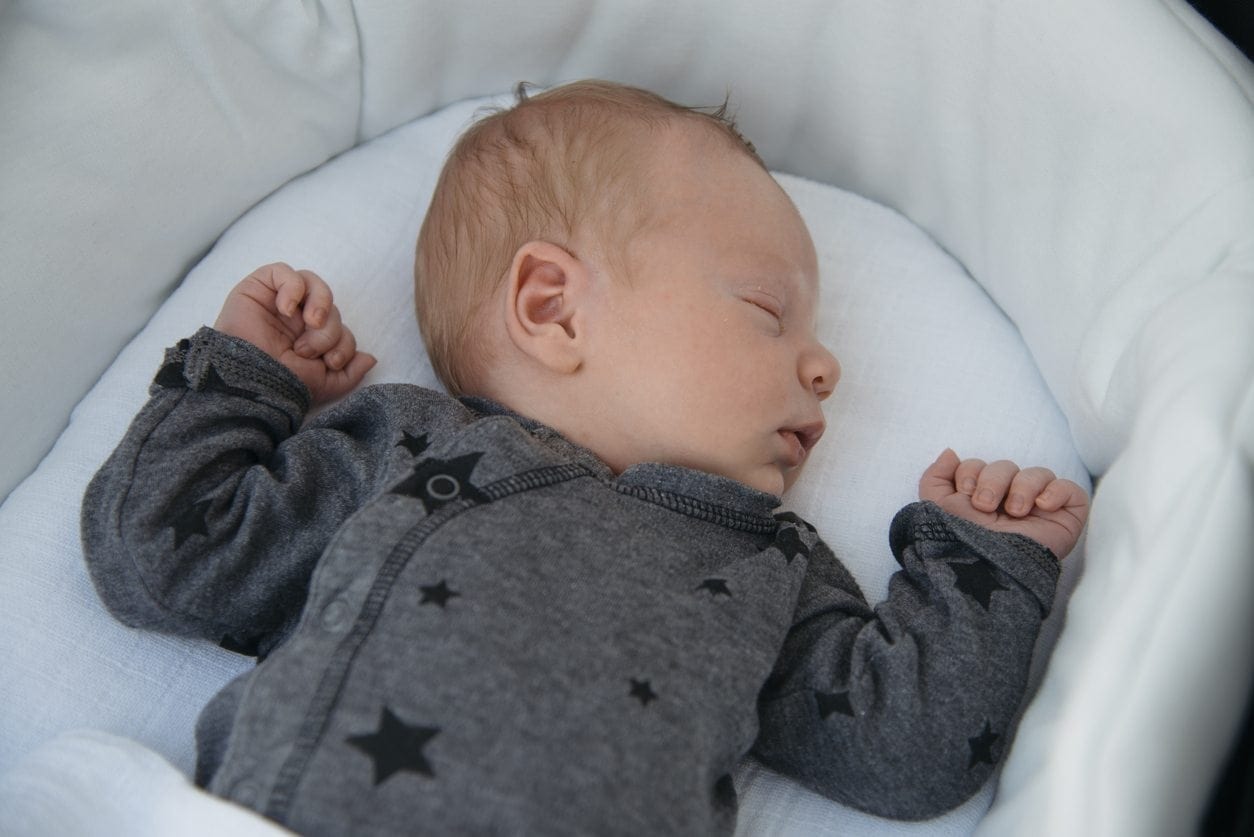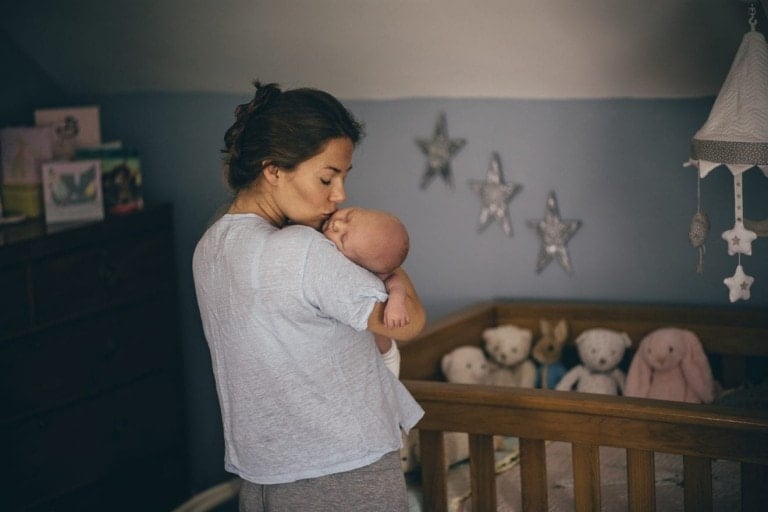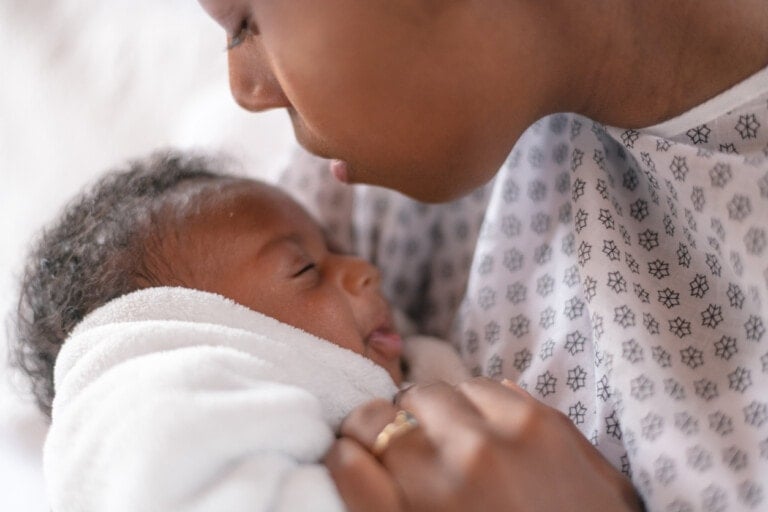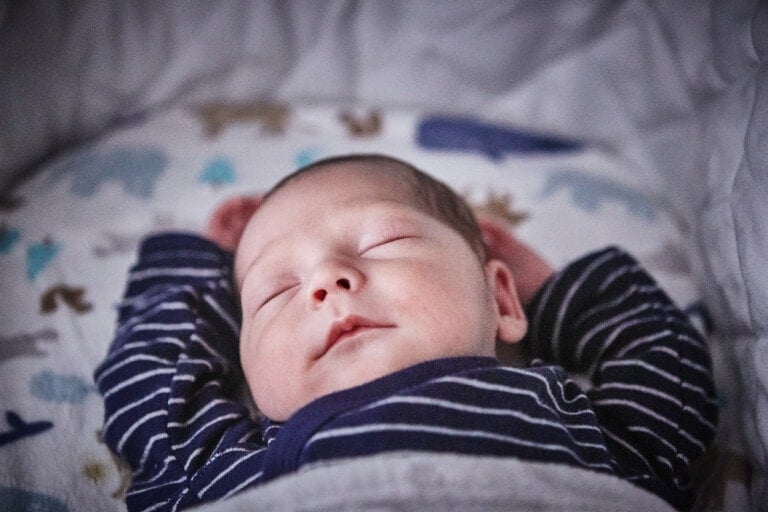Disclaimer: This article is written by a mother sharing her experience with her babies and sleep. One approach does not suit all babies and families. Every baby is different. Follow your parenting intuition and do what is best for your child. Sleep experts suggest that at 6 to 12 weeks old, you should begin developing a quality bedtime routine, and at around 4 to 6 months (or later for some babies), sleep training your child is an option.1,2
I was in the middle of my first pregnancy when a friend had her first baby. It did not take long for me to realize that the image of the peaceful sleeping baby in those diaper commercials was a complete lie, and reality struck. OH MY WORD, this is going to be a lot harder than I had imagined. Babies don’t just start sleeping through the night on their own!
My friend and her husband were now prisoners on their couch, each taking turns holding the baby all night while one got to sleep. I was petrified. What was my life going to become? I loved the nighttime with my husband, cuddled in our bed, watching our shows, and talking about our day. So, I decided to use the remainder of my pregnant months to figure out ways to troubleshoot sleeping with a newborn.
The secret sauce my husband and I used to have our boys sleeping through the night for 10 hours straight by 10 weeks old is quite simple, but putting in the work is hard.
First 6 Weeks = Survival
For the first 6 weeks of life, I focused on making sure baby was eating enough and figured out anything like acid reflux or colic.
“Eat, Play, Sleep” Routine
This is the routine I followed all day. The Eat, Play, Sleep Routine can be regimented to specific times or relaxed, but this is the meat and potatoes to getting on the right track.
Wake Up Time
Start every day at about the same time and make mornings a big deal no matter how bad the night may have gone. Open the blinds, turn the TV or music on, and make breakfast. Once breakfast is over, change clothes, even if it’s into different pajamas.
Full Feedings
Ensuring your baby is full and not falling asleep mid-feed is important. We don’t want to force-feed our babies, but we also don’t want them to eat only a small amount because they will shortly wake up for more. With breastfeeding, it is common for babies to begin eating and fall asleep on the breast. They will then lightly suckle for comfort — almost like a pacifier.
Do what you can to keep your baby awake and actively eating those first few weeks when they are just so sleepy. Undress them, stop and burp them mid-feed, change their diaper, anything to keep them awake and focused on the task at hand until they are full. When we started giving our baby formula, I didn’t want him to fall asleep mid-feed and waste half of a bottle every feeding, so I tickled his toes and undressed him when he was drifting off to sleep.
This is also an important step because it sets up their metabolism for the day. Their body starts to realize they eat every 2-3 hours during the day and can go a little longer at night, setting the parents up for 3-4 hour stretches at night.
Play
Play and engage with your baby. Sit them up and face them while talking, read to them, sing, show them toys, lay them on their play mat, or place them in the swing by the window. Change it up so they don’t get used to one particular thing. I didn’t want to get in the habit of holding them the whole time; they are okay being away from mom.
Sleep
Nap Time Sleeping
When playtime is coming to a close, it will be obvious. They will start getting antsy and irritated. Lay baby down for a nap in a pack-and-play, swing, crib, or bassinet, or if there are errands to run, planning nap time for the car ride or outing is always an option.
Bedtime Sleep
The biggest goal in this process is to get your baby sleeping through the night, so be consistent in this area. Change their diapers, put their PJs on, and feed them their last feeding of the “awake” day.
Then, swaddle them, lay them in their cribs, or wherever they will sleep at night. This should be consistent. Make sure the room is dark and the sound machine is on. Say something like “night-night, and I love you, see you in the morning,” and walk out. If they fuss, it is okay. Let them fuss or cry for 30 seconds to 1 minute before rushing back in there since there will be times they just need to settle themselves in.
Sometimes, they are not going to go to sleep right away. In this case, go in and make sure baby is situated okay and then leave again. Do not let them get up, come to bed with you, or hold them until they fall asleep. Moms can tell the difference in their baby’s cry, for example, between protesting and needing something.
What NOT To Do
If the baby gets up during the night to eat, these are things not to do:
- Turn the lights on. Only turn on necessary lights to make a bottle or breastfeed, walk, change them, and put them back to bed.
- Turn the TV on or have a lot of noise going.
- Make eye contact and interact with the baby.
- Drag the feeding out. Feed baby and burp them on the way back to the crib.
Following these guidelines helped both of my boys sleep through the night. One achieved this at 7 weeks, and the other at 9 weeks. One could argue we were blessed with naturally good sleepers, but my husband and I felt it was a priority for us, so we worked hard at it.
There are, of course, instances where this may take longer to achieve, but remain patient and keep the end goal in mind. Putting in the initial work and setting up the structure for my boys was so rewarding. I could plan outings, prep dinner, and even have time for a quick workout and shower, knowing I had time while the baby slept. Sleep training greatly rewards everyone in the family; parents are rested, and the baby is rested. Rest equals happy parents, and happy parents can tackle anything.






























